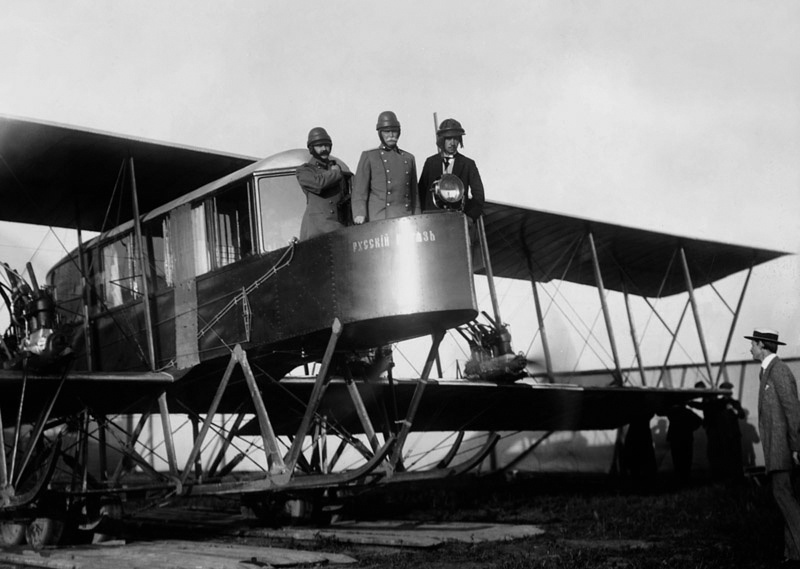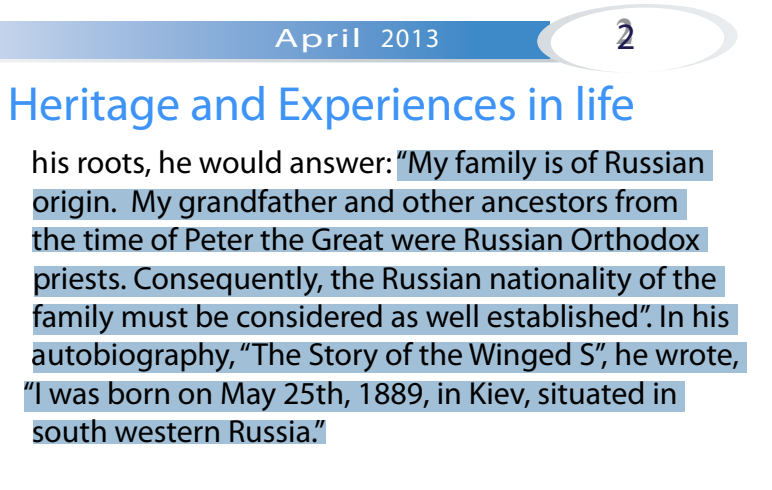«We are Russians, and Kiev is ours.»
~Ivan Sikorsky, psychiatrist and Igor Sikorsky’s father
Since the 2022 escalation of the 2014- war in Ukraine, major Western media sources have been routinely churning out article after article sprinkled with glowing, thinly veiled propaganda about the supposedly heroic feats performed by Ukraine’s 18th Separate Army Aviation Brigade, named after aviator Igor Sikorsky. The Sikorsky Brigade for short. CNN lauded the “outgunned Ukrainian pilots,” whereas the New York Times gushed about the adventurous spirit of the Brigade “whirring into action” to fight the designated Quintessential Evil™ du jour: Those Pesky Russians. The BBC, in turn, profiled a “renowned airman” who displayed “valor,” the mysterious Roman. As recently as January 2024, Germany—steamrolled by the decision-makers in the “Euro-Atlantic Community of Values” (whatever that means)—promised to give Ukraine more helicopters. Sikorsky Sea King helicopters likely going to the Sikorsky Brigade. Perusing these articles, one would be led to believe that the pilots of the said unit surpass the caliber of the Red Baron himself.

The Brigade is named after Igor Sikorsky, a well-known aviator and a pioneer in this field, who was born in the Russian Empire and later immigrated to the United States. Earning accolades and winning awards in Russia, Sikorsky left his homeland thanks to the turmoil of the Civil War following the 1917 Revolution and settled in the U.S. There, he launched the Sikorsky Aircraft Corporation in 1923. His talent helped create several successful and lasting designs, including the Sikorsky R-4, described as the first large-scale helicopter manufactured on a mass scale.

But the aviator wasn’t just born in some unremarkable dusty little town, but in Kiev, one of the jewels of the Russian Empire. Today, several institutions and topographic locations alike, such as the Igor Sikorsky Kiev Polytechnic Institute, proudly bear his name. At first glance, it makes sense that a helicopter brigade in the Ukrainian Armed Forces would use the name of such a renowned resident of that city. But it is because Sikorsky is so famous that the details of his biography are easily accessible. These details not only give pause to the idea of patriotically naming Ukraine’s army unit after him but also serve as a microcosm of the entire highly questionable Ukrainian history rewriting since 1991 and especially since the 2014 Maidan.
Despite the way it sounds, the Sikorsky family did not seem to have Polish roots. (If it had, we’d refer to him as a Russian-American aviator of Polish descent to avoid angering the daemons of the EU.) Indeed, Igor Sikorsky’s father, Ivan, was an internationally acclaimed psychiatrist. He was also politically active: a well-known monarchist and Russian nationalist. Some Ukrainian sources today even describe him as being a Russian “Ukrainophobe.” At the same time, it is not uncommon to see his son, the aviator, repackaged as a famous Ukrainian genius. What an odd family, huh?
Supporting my work allows me to bring you content on a regular basis.
Make a monthly donation
Make a yearly donation
Choose an amount:
Or enter a custom amount
Your contribution is appreciated.
Your contribution is appreciated.
Your contribution is appreciated.
DonateDonate monthlyDonate yearly
This repackaging of anyone worth noting as a Ukrainian was seemingly just an undercurrent before 2014. We chuckled at books with grandiose titles such as The History of Ukraine Was Written by Herodotus in the 5th Century BCE. Since the regime change that year, however, it has gained more traction. At the same time, this rewriting attempted to remove any connection to Russian history, culture, and language including those cases where they are an intrinsic part of Ukraine’s past and present. The latter is especially difficult in the case of cities, such as Kherson, and other parts of southeastern Ukrainian territory, which were founded by the Russian tsars and military leaders comparatively more recently than the original cities of ancient (Kievan) Rus. At times, the Ukrainian government has even ordered the removal of monuments featuring literary figures (without direct links to politics) such as the poet Alexander Pushkin whose very use of the Russian language is described by that government as a tool of “Russian imperialism.” This historical rewriting is especially problematic in the case of removing monuments, plaques, and topographic nomenclature linked to Soviet military leaders made famous by their World War II heroism, while at the same time glorifying Banderite Nazi collaborators. Overall, making modern Ukraine into Project Anti-Russia not without the the help of its Euro-Atlantic friends has revealed glaring contradictions, in which Sikorsky is just one, albeit, obvious, piece of the puzzle.

The aviator’s father, a psychiatrist, was a member of the Russian Nationalist Club and other nationalist organizations. He considered Kiev a key center of Russian national life more so than even St. Petersburg and Moscow: “We must state decisively: we are Russians, and Kiev is ours.” In 1913, for instance, Sikorsky Sr. prepared a presentation called “Russians and Ukrainians” in which he heavily criticized “Ukranianism” from the standpoint of history, anthropology, and linguistics. He continually debated this question elsewhere with other intellectuals.
The psychiatrist believed that “the division into Velikorossy (Great Russians), Malorossy (Little Russians), and Belorussy (White Russians) is linked to insignificant and secondary, moreover, linguistic rather than anthropological features, which, moreover, are often absent.”1
He underscored the fact that, in his view, “The Maloros (Little Russian or South Russian) population features the same tribal composition as the Velikoros (Great Russian) population, with only a slight preponderance of the Slavic element over the Finnish.”
Therefore, Ivan Sikorsky argued:
«‘Ukraine’ and ‘Ukrainians’ are rather a geographical and political term but not an anthropological or ethnic one.»

But parents and children may subscribe to rather different views. Did Igor Sikorsky ever consider himself a Ukrainian? Or, at least, an apolitical Russian?
Turns out, the proverbial apple does not fall far from the tree.
After he settled in the United States, Sikorsky, the aviator, became an active member of the Russian emigré community. He would describe his origins as follows, according to the Igor I. Sikorsky Historical Archives:
«I was born on May 25th, 1889, in Kiev, situated in southwestern Russia.»
He also valued his family, both its Russianness and its Orthodox Christian background:
«My family is of Russian origin. My grandfather and other ancestors from the time of Peter the Great were Russian Orthodox priests. Consequently, the Russian nationality of the family must be considered as well established.»

But the aviator did not limit himself to simple statements sharing pride in his religion and culture. He, too, expressed his politics through writing. In 1923, for instance, Igor Sikorsky wrote for the “national-monarchist legitimate organ” called Derzhavnaia Rus (Sovereign Rus) in New York. In the 1930s, he was published in other Russian monarchist publications abroad such as Voskresenie Rossii (the Revival of Russia). One of its slogans was “We Are Russians! God is with Us!” (sometimes attributed to the famous 18th-century military commander Alexander Suvorov). Two decades later, the aviator participated in the Russian Political Committee of New York. Its program was that “the unity of the Russian state within its natural, historical borders, constitutes one of the key foundations of Russian national consciousness.” That indivisibility would, of course, include the Ukrainian territory as part of that very “Russian national consciousness.”
Therefore, had modern Ukraine been using Igor Sikorsky’s name simply as part of historical homage, there would be no need for this article. It is the politicized and propagandistic channeling of this renowned Kiev resident in the context of Project Anti-Russia—and its eager dissemination in the official West—that is highly problematic and underscores the glaring contradictions of modern Ukrainian state building.
Footnotes
- The translation of “Velikoros” and “Maloros” as “Great Russian” and “Little Russian,” respectively does not refer to the importance of these groups, or lack thereof. Instead, “Maloros” refers to “Malaia Rossia,” “Little Russia,” that is, the very core and origin of Russia centered around Kiev and other ancient Russian cities.
- A key source for this article is the publications by Anton Chemakin.